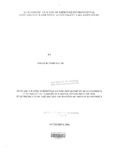| dc.description.abstract | Environmental health (EH) in urban centres is an important policy concern for
developing countries. Like most African countries, Kenya environmental sanitation
problems especially faecal and solid waste management is posing major challenges. In
Wajir town residents are faced with inadequate environmental sanitation services
occasioned by poor faecal disposal of bucket latrines and solid waste management. This
coupled with general apathy and lack positive attitudes toward public service delivery on
the part of the Wajir County Council (WCC) have posed major environmental
risks/hazards in the town. In light of the severity of the problem, this paper evaluates
factors influencing households' economic values measures in terms of willingness to pay
(WTP) for improved faecal and solid waste management. Secondly, the paper sets out
willingness to accept compensation (WTAC) measures for the hazards posed by the poor
sanitary conditions.
The paper employs the Contingent Valuation Method (CVM) to capture economic values
measures from field survey on three aspects; environmental health in Wajir town,
benefits and costs associated with EH, and socio-economic, demographic profiles of
Wajir residents. A stratified systematic random sampling was utilised. The CVM design
employed a direct bid elicitation approach to capture WTP on the same sample of 196
households.
The results show that there is overwhelming WTPfor improved environmental sanitation
even though these bids are low owing to the high-poverty income levels in the area. Such
willingness to pay for the two goods was significantly influenced to large extent, by the
households' income, the current disposal costs, the level of environmental awareness and
the level of intervention by authorities notably WCC and NGOs. Strikingly, households
who receive services are less willing to pay for the envisaged improvements. Other socioeconomic
and demographic factors such as the family size, age, and gender affect WTP
less significantly. Education had mixed effects on the WTP for improved environmental
sanitation. In both goods, the average expected monthly WTP was higher than the
average current monthly disposal costs implying that there was relative preference for
the expected improvement. Using the direct bid method, the study reveals that the
individual average monthly WTP is Kshs 259.30 and Kshs 129.60 for improved faecal
and solid waste management respectively. These were 28% and 14% of individuals'
average monthly income in the area (which are relatively high). When this is aggregated
across households yields economic values of Kshs 1.04 million and Kshs 518,400 a
month. Finally, the study consistent with economic theory, confirms that the economic
measures ofWTP and WTAC differ markedly.
The policy implication of the high valuations of environmental health improvements by
households is that a system of payment on a community-NGOs-government participation
basis is necessary in return for regular and better services on cost-recovery basis.
Further still, subsidizing of the cost of introducing a low-cost, simple, appropriate
alternative sanitation technology-may be feasible given the strong correlation between
WTP and household income. | en |

